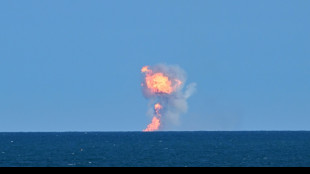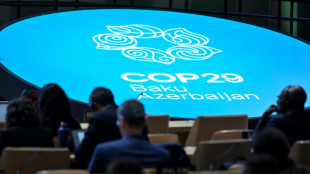
-
 Australia's Jason Day eyes more major glory after resurgence
Australia's Jason Day eyes more major glory after resurgence
-
Machu Picchu security boosted after visitors spread human ashes

-
 Popovic hails Australia character in 'crazy' World Cup qualifier
Popovic hails Australia character in 'crazy' World Cup qualifier
-
Taliban govt clearing 'un-Islamic' books from Afghanistan shelves

-
 Argentina beat Peru as Uruguay hold Brazil
Argentina beat Peru as Uruguay hold Brazil
-
Asian markets struggle as traders weigh geopolitical tensions

-
 Tatum stars as Celtics end Cavaliers unbeaten start
Tatum stars as Celtics end Cavaliers unbeaten start
-
Hurting India under pressure in blockbuster five-Test Australia series

-
 'They killed her dream': Israel strike leaves woman footballer in coma
'They killed her dream': Israel strike leaves woman footballer in coma
-
Iraq holds its first census in nearly 40 years

-
 Iraqis face tough homecoming a decade after IS rampage
Iraqis face tough homecoming a decade after IS rampage
-
Russian net tightens around last civilians left in eastern Ukraine

-
 Olympic champion Tebogo aims to inspire next generation of African athletes
Olympic champion Tebogo aims to inspire next generation of African athletes
-
Valencia on target as ten-man Ecuador upset Colombia

-
 'Rust' to premiere three years after on-set shooting
'Rust' to premiere three years after on-set shooting
-
Strike at French cognac maker Hennessy over measures in China spat

-
 Xi, Lula meet in Brasilia to 'enhance ties'
Xi, Lula meet in Brasilia to 'enhance ties'
-
SpaceX fails to repeat Starship booster catch, as Trump watches on

-
 'I have left a legacy': Nadal retires from tennis
'I have left a legacy': Nadal retires from tennis
-
US recognizes Venezuela opposition's Gonzalez Urrutia as 'president-elect'

-
 European powers, US seek to censure Iran at UN nuclear watchdog board
European powers, US seek to censure Iran at UN nuclear watchdog board
-
UNAIDS chief says husband, Ugandan opposition figure Besigye, 'kidnapped'

-
 Nadal's sensational career ends as Netherlands defeat Spain in Davis Cup
Nadal's sensational career ends as Netherlands defeat Spain in Davis Cup
-
US announces talks with Israel over civilian casualties in Gaza

-
 SpaceX fails to repeat Starship booster catch, as Trump looks on
SpaceX fails to repeat Starship booster catch, as Trump looks on
-
G20 summit ends with Ukraine blame game

-
 Trump appoints TV celebrity 'Dr. Oz' to key US health post
Trump appoints TV celebrity 'Dr. Oz' to key US health post
-
European stocks fall on Ukraine-Russia fears, US focused on earnings

-
 Last-gasp Szoboszlai penalty rescues Hungary draw with Germany
Last-gasp Szoboszlai penalty rescues Hungary draw with Germany
-
Germany, Netherlands draw as Nations League group stage ends

-
 Hong Kong tycoon Jimmy Lai takes witness stand in collusion trial
Hong Kong tycoon Jimmy Lai takes witness stand in collusion trial
-
Guardiola set to extend stay as Man City boss - reports

-
 Minnows Botswana hold Egypt to qualify with Mozambique, Tanzania
Minnows Botswana hold Egypt to qualify with Mozambique, Tanzania
-
Inter Miami coach Martino leaving club for 'personal reasons' - club source

-
 Chinese man sentenced to 20 months for Falun Gong harassment in US
Chinese man sentenced to 20 months for Falun Gong harassment in US
-
Hong Kong court jails 45 democracy campaigners, drawing condemnation

-
 'I did it for Rafa': Alcaraz after keeping Spain Davis Cup dream alive
'I did it for Rafa': Alcaraz after keeping Spain Davis Cup dream alive
-
Alcaraz keeps Spain and Nadal Davis Cup dream alive

-
 Trump names China hawk Howard Lutnick commerce secretary
Trump names China hawk Howard Lutnick commerce secretary
-
Europe's pivotal role in bid to strike COP29 climate deal

-
 MotoGP champion Martin falls on Aprilia debut
MotoGP champion Martin falls on Aprilia debut
-
Bodies burned after Haiti police, civilians kill 28 alleged gang members

-
 'Probably my last match': Nadal after Davis Cup singles defeat
'Probably my last match': Nadal after Davis Cup singles defeat
-
Iran faces new censure over lack of cooperation at UN nuclear meeting

-
 Afghan woman teacher, jailed Tajik lawyer share top rights prize
Afghan woman teacher, jailed Tajik lawyer share top rights prize
-
Pressure mounts on Scholz over bid for second term

-
 Take two: Biden makes it into G20 leaders' photo
Take two: Biden makes it into G20 leaders' photo
-
Russia vows response after Ukraine fires long-range US missiles

-
 Spain's Nadal loses in Davis Cup quarter-finals singles opener
Spain's Nadal loses in Davis Cup quarter-finals singles opener
-
Four elite Brazil officers arrested over alleged 2022 Lula murder plot


Iraqis face tough homecoming a decade after IS rampage
A decade after Islamic State group extremists rampaged through northern Iraq, Moaz Fadhil and his eight children finally returned to their village after languishing for years in a displacement camp.
Their home, Hassan Shami, is just a stone's throw from the tent city where they had been living, and it still bears the scars of the fight against IS.
The jihadists seized a third of Iraq, ruling their self-declared "caliphate" with an iron fist, before an international coalition wrestled control from them in 2017.
Seven years on, many of the village's homes are still in ruins and lacking essential services, but Fadhil said he felt an "indescribable joy" upon moving back in August.
Iraq -- marred by decades of war and turmoil even before the rise of IS -- is home to more than a million internally displaced people.
Baghdad has been pushing for the closure of the displacement camps, with the country having attained a degree of comparative stability in recent years.
Most of the camps in federal Iraq have now been closed, but around 20 remain in the northern autonomous Kurdistan region, which according to the United Nations house more than 115,000 displaced people.
But for many, actually returning home can be a difficult task.
After getting the green light from Kurdish security forces to leave the camp, Fadhil moved his family into a friend's damaged house because his own is a complete ruin.
- 'Beautiful memories' -
"Water arrives by tanker trucks and there is no electricity," said the 53-year-old.
Although the rubble has been cleared from the structure he now lives in, the cinder block walls and rough concrete floors remain bare.
Across Hassan Shami, half-collapsed houses sit next to concrete buildings under construction by those residents who can afford to rebuild.
Some have installed solar panels to power their new lives.
A small new mosque stands, starkly white, beside an asphalt road.
"I was born here, and before me my father and mother," said Fadhil, an unemployed farmer.
"I have beautiful memories with my children, my parents."
The family survives mainly on the modest income brought in by his eldest son, who works as a day labourer on building sites.
"Every four or five days he works a day" for about $8, said Fadhil.
In an effort to close the camps and facilitate returns, Iraqi authorities are offering families around $3,000 to go back to their places of origin.
To do so, displaced people must also get security clearance -- to ensure they are not wanted for jihadist crimes -- and have their identity papers or property rights in order.
But of the 11,000 displaced people still living in six displacement camps near Hassan Shami, 600 are former prisoners, according to the UN.
They were released after serving up to five years for crimes related to membership of IS.
- Not that simple -
For them, going home can mean further complications.
There's the risk of ostracism by neighbours or tribes for their perceived affiliation with IS atrocities, potential arrest at a checkpoint by federal forces or even a second trial.
Among them is 32-year-old Rashid, who asked that we use a pseudonym because of his previous imprisonment in Kurdistan for belonging to the jihadist group.
He said he hopes the camp next to Hassan Shami does not close.
"I have a certificate of release (from prison), everything is in order... But I can't go back there", he said of federal Iraq.
"If I go back it's 20 years" in jail, he added, worried that he would be tried again in an Iraqi court.
Ali Abbas, spokesperson for Iraq's migration ministry, said that those who committed crimes may indeed face trial after they leave the camps.
"No one can prevent justice from doing its job", he said, claiming that their families would not face repercussions.
The government is working to ensure that families who return have access to basic services, Abbas added.
In recent months, Baghdad has repeatedly tried to set deadlines for Kurdistan to close the camps, even suing leaders of the autonomous region before finally opting for cooperation over coercion.
Imrul Islam of the Norwegian Refugee Council said displacement camps by definition are supposed to be temporary, but warned against their hasty closure.
When people return, "you need schools. You need hospitals. You need roads. And you need working markets that provide opportunities for livelihoods," he said.
Without these, he said, many families who try to resettle in their home towns would end up returning to the camps.
F.Bennett--AMWN